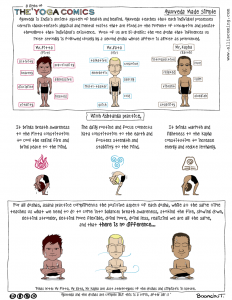Book now
Mysore style astanga self-practice
Mon-Fri 6.15-9am (last entry 7.30am)
Sat 7.30am start (led class last Saturday of each month)
Led Classes
Monday 6pm, Wednesday 6pm & Thursday evenings 7.30pm
Friday evenings 6pm
The literal translation to Ayurveda is ‘the science of life’ or ‘the knowledge living’, or ‘the art of longevity’ the essence that makes life worth living!
According to Ayurveda each food contains different healing properties known as ‘rasa’. Rasa means taste and emotion. This aspect of food has a deep effect on our emotional and physical health.
Taste fit into six categories. They are sweet, sour, bitter, astringent, salty and pungent (Kathryn’s favourite;0)
Each have a specific effect on individual constitution and well being.
We are all born with a unique combination of energy that defines our constitution or ‘Prakuti’.
Echoing the world we live in, we too are all made of those same elements, fire, water, earth, air and ether. Our prakuti is determined by the proportions and balance of those elements within each of us.
Ayurveda believes there is no single path to health as we each have our own unique combination. Each person must be treated as an individual and each of us must learn to be aware of the different effects that food has upon our mind (emotions) body and spirit.
The three basic constitutions are determined by a combination of energies called ‘doshas’
 The constitution Vata (governed by air & ether). Pitta (governed by fire & water) and Kapha (governed by water and earth).
The constitution Vata (governed by air & ether). Pitta (governed by fire & water) and Kapha (governed by water and earth).
Very loosely, if you are a Vata constitution you will you often suffer from wind , cold hands and feet and will have dry hair and skin.
If you are a pitta constitution you will generate a lot of internal heat and could be frequently moody/angry and will often feel thirsty.
If you are kapha you gain weight easily produce a lot of mucus and will suffer frequently with coughs and colds.
Most of us are bi-doshic: the one dosha that influences us most strongly is followed closely by a second dosha whose affect is almost as pronounced.
“Along with diet and lifestyle, the practice of yoga asana can help bring balance to the doshas. Ashtanga brings warmth and fire to the kapha constitution to increase energy and reduce lethargy. It brings heat and sweat to the Vata constitution to allow the release of toxins through the skin and foster stability of mind. Ashtanga brings breath awareness to the Pita constitution to cool the raging fire and bring peace to the mind. For all doshas, asana practice compliments the positive aspect of each dosha, while at the same time, teaches us what we need to do to come into balance: breath awareness, stoking the fire, slowing down, getting stronger, getting more flexible, doing more, doing less, realizing we are all the same, and that there is no difference” – Jessica Walden
There are eight rules to an ayurvedic diet. They are:
Prakuti – Choose a combination of foods depending on their nature. Inherent heaviness or lightness (Meat is heavy to digest, vegetables are light)
Karana – The processing of foods affects their influence on the body.
Samyoga – Combine foods healthily and never mix contrary foods such as fish and diary as they both need a different rate of acid secretion and acid concentration in the stomach for digestion.
Rashi – Control the food you eat according to your constitution.
Desha – Eat according to your environment. Take into consideration the seasons.
Kala – Be attentive to the timings of when you eat. Eat only when the previous meal has been fully digested.
Upyoga Sanstha – Follow the golden rules of eating: eat the food when it’s hot. Focus on eating, don’t be distracted by talking etc. Be calm and unhurried.
Upabhokta – Never force yourself to eat something that is going against your instincts.
Hindus also believe that food is a source of health & healing and can govern our moods and emotions. By eating the flesh of animals we eat their inner most being and introduce their anxieties fears and instincts into our bodies. This can bring us into the lower realm of consciousness where spiritual awareness which is primary in the purpose of the Hindu way of life becomes impossible.
Studies have proved that a vegetarian diet can provide a greater range of nutrients and fewer toxins. Vegetarians are usually less prone to major illness and lead longer healthier lives.
As Albert Einstein said “ Nothing will benefit human health and increase chances for survival of life on earth, as much as the evolution of a vegetarian diet”
Cartoon credit – Boonchu Tantin
Mon-Fri 6.15-9am (last entry 7.30am)
Sat 7.30am start (led class last Saturday of each month)
Monday 6pm, Wednesday 6pm & Thursday evenings 7.30pm
Friday evenings 6pm